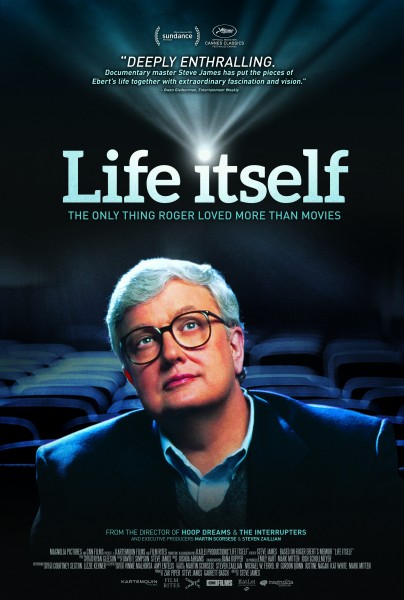 Life Itself
Directed by: Steve James
Documentary
Running Time: 1 hr 55 mins
Rating: R
Release Date: July 4, 2014 (Chicago)
Life Itself
Directed by: Steve James
Documentary
Running Time: 1 hr 55 mins
Rating: R
Release Date: July 4, 2014 (Chicago)
PLOT: The life story of Roger Ebert, Film Critic.
WHO'S IT FOR? Anyone who has ever loved a movie.
OVERALL
In terms of what's out there that is worth checking out, Life Itself is the movie of the summer. Its experience is a direct recognition of a quality that Ebert has said is most important regarding a film, before considering it for either "Great Movies" or "Your Movie Sucks" levels -- to engage with it emotionally. Warmed by the embrace of this moving documentary from director Steve James, I filled Ebert's last screening room with my big dumb laugh more than a few times, and tried to cry quietly while watching passages about the true loves in his life. To watch footage of Ebert in his twilight time, and to listen to the words of his memoir, is to witness natural profundity. This is a documentary that celebrates the life of its subject, and his words, by continuing their singular spirit.
As Ebert was famously a populist and more importantly a Chicagoan, Life Itself shares a grand existence with its feet planted on the ground. James' documentary doesn't treat him like the master that he is, but as an Illinois boy whose gift for thought (the wisdom that pours from even just his emails!) was earned by hard work. This then translated to a love for words and writing. As he rose from college student to newspaperman and then film critic TV star, he worked hard. All the while as he ascended to these definitive heights, he remained fallible. He was respected through his hard-work, wisdom, and intelligence.
By the film's end, Ebert is bestowed his wonder in Life Itself because of how he defined what it meant to be as a worker of Chicago. The last shot of the film is captured at the Old Town Ale House, a wooden jazz-filled jukebox bar with conversation filling the alcohol-enhanced atmosphere, not TV screens. Before a gradual fade, it is a shot of Ebert's portrait on the wall.
As Ebert compares his life to that of a film, he has certainly found a perfect editor for his story, in Hoop Dreams and The Interrupters director Steve James. It should be noted that James is also a Chicago institution, but one with the same passion for any piece of life that really moves him. (James is warm too, and incredibly approachable on numerous occasions; another Chicagoan who creates worldwide worthy art with humbled determination.) Even the locations of this movie's interviews are indicative of the casual Chicago spirit within this project, like the back section of Old Town Ale House, or having Jonathan Rosenbaum talk inside a chilly-looking Music Box Theater.
With James involved, Life Itself not only becomes an incredibly well-edited organization of massive life chapters, but a personal journey. In one significant regard, James recognizes the personal nature of Ebert's work, in which he was writing not for himself, but for those who want to share the experience of a film with him. James is just as curious as we are about Ebert, asking him questions not just about movies but about life (sometimes, about things that even Ebert knows are already in the memoir). Similarly, James' camera (shown in a poetic hospital mirror shot in the beginning, as directed of course by Ebert) takes viewers to health conditions of Ebert that remained only light jokes on his Twitter feed, or happened behind quiet closed doors in the same screening room I saw Life Itself in.
There are numerous emotionally moving passages to be found in Life Itself, and one of them remains a dark confession from Martin Scorsese. It is an extremely rare moment in which the hyperactive motormouth is rarely silenced during his own reflection about Ebert's influence on his career. He is brought to a point of humbled tears. This is one memory of a film that is built on a grand gesture about art regarding its fruition, and heralds as to how there will always be a need for critics even long after writers like Ebert have become archival posts. As much as artists like Scorsese may earn their prestige for the popular work they create, the conversation about their creations, or about those who may be due for Scorsese heights, is just as important. To have the power that Ebert did as a philosopher of film is no limited task. This is a documentary worthy of his work.
FINAL SCORE: 9/10
